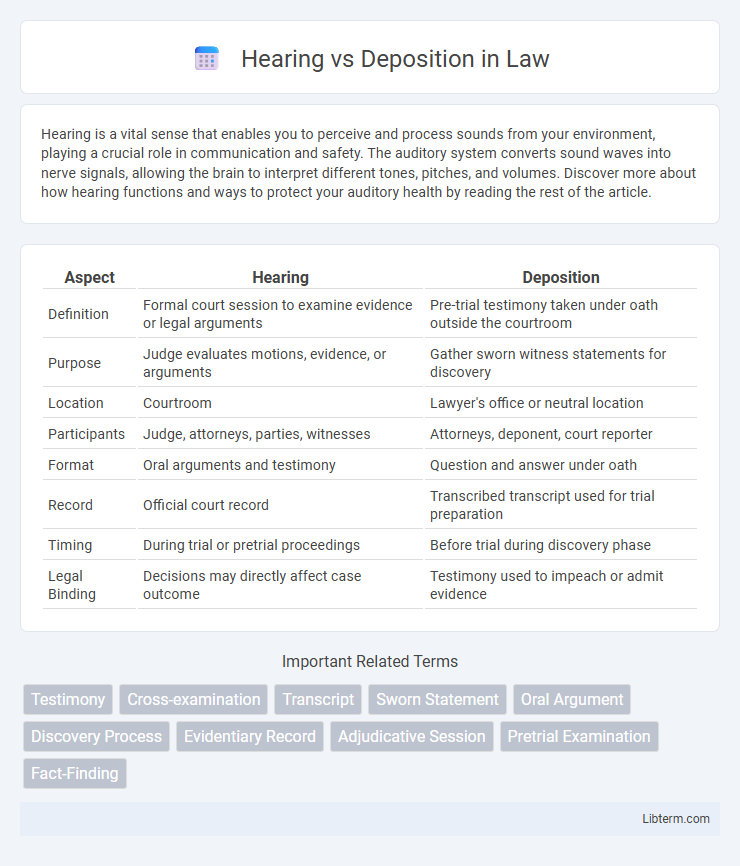Hearing is a vital sense that enables you to perceive and process sounds from your environment, playing a crucial role in communication and safety. The auditory system converts sound waves into nerve signals, allowing the brain to interpret different tones, pitches, and volumes. Discover more about how hearing functions and ways to protect your auditory health by reading the rest of the article.
Table of Comparison
| Aspect | Hearing | Deposition |
|---|---|---|
| Definition | Formal court session to examine evidence or legal arguments | Pre-trial testimony taken under oath outside the courtroom |
| Purpose | Judge evaluates motions, evidence, or arguments | Gather sworn witness statements for discovery |
| Location | Courtroom | Lawyer's office or neutral location |
| Participants | Judge, attorneys, parties, witnesses | Attorneys, deponent, court reporter |
| Format | Oral arguments and testimony | Question and answer under oath |
| Record | Official court record | Transcribed transcript used for trial preparation |
| Timing | During trial or pretrial proceedings | Before trial during discovery phase |
| Legal Binding | Decisions may directly affect case outcome | Testimony used to impeach or admit evidence |
Understanding Hearings and Depositions
Hearings serve as formal court sessions where judges evaluate legal arguments and evidence to make rulings, while depositions involve sworn, out-of-court testimonies used to gather information and clarify facts before trial. Understanding the distinction is crucial; hearings focus on decision-making and legal interpretation, whereas depositions focus on fact-finding and witness examination. Both play integral roles in the litigation process, supporting case development and judicial outcomes.
Key Definitions: Hearing vs Deposition
A hearing is a formal legal proceeding held before a judge or magistrate to evaluate evidence and make rulings on motions, evidentiary issues, or other matters in a case. A deposition is a pre-trial discovery process where witnesses provide sworn testimony outside of court, recorded for later use during trial or negotiation. Key distinctions include the hearing's role in judicial decision-making versus the deposition's purpose in evidence gathering and fact-finding.
Legal Contexts for Hearings and Depositions
Hearings and depositions serve distinct purposes in legal contexts, with hearings typically conducted in court to allow judges to evaluate evidence, legal arguments, and procedural issues in real-time. Depositions occur outside the courtroom, providing attorneys the opportunity to obtain sworn testimony from witnesses or parties involved before trial, often used for gathering facts and preserving testimony. Both processes are integral to pre-trial discovery and trial preparation but differ in setting, formality, and immediate impact on case progress.
Purpose and Objectives of a Hearing
A hearing primarily aims to provide a formal setting where parties present evidence and legal arguments before a judge to resolve specific issues or motions in a case. Its objectives include fact-finding, allowing judges to evaluate credibility, and making preliminary or final rulings. Unlike a deposition, which is an out-of-court sworn testimony used for discovery, a hearing focuses on judicial decision-making and case management.
Purpose and Objectives of a Deposition
A deposition serves as a pre-trial discovery tool designed to gather sworn testimony from witnesses or parties involved in a legal dispute, enabling attorneys to assess the strengths and weaknesses of the case. Its primary purpose is to obtain detailed information, preserve witness statements, and evaluate credibility before trial. Unlike hearings, depositions are conducted outside the courtroom and often involve extensive questioning to uncover factual evidence and clarify issues.
Procedures: How Hearings and Depositions Differ
Hearings involve formal court proceedings where a judge reviews evidence and testimonies in a structured setting, often requiring strict adherence to procedural rules and live oral arguments. Depositions are pre-trial discovery tools conducted outside the courtroom, allowing attorneys to question witnesses under oath to gather information and preserve testimonies, typically recorded by a court reporter. The key procedural difference lies in the formality and setting: hearings are judicial determinations held in court, whereas depositions are investigative steps held privately and serve as evidence gathering rather than decision-making events.
Participants: Who Attends Hearings vs Depositions
Hearings typically include judges, attorneys, parties involved, and occasionally witnesses, all gathered in a formal courtroom setting. Depositions involve the deponent, attorneys from both sides, and a court reporter, usually held outside the courtroom. Judges are generally absent during depositions, emphasizing their focus on gathering testimony rather than making immediate legal decisions.
Admissibility of Evidence: Hearing vs Deposition
Hearings typically involve live testimony where judges assess the admissibility of evidence in real time, allowing for immediate objections and rulings. Depositions consist of sworn out-of-court testimony recorded for later use, with admissibility determined by trial courts based on relevance, hearsay rules, and procedural safeguards. Courts often scrutinize hearsay exceptions and the reliability of deposition testimony when deciding its admissibility during trial proceedings.
Outcomes and Implications of Each Process
Hearings often result in immediate rulings or judgments that directly affect the direction of a legal case and can establish official records used in appeals. Depositions provide detailed witness testimonies under oath, shaping case strategies by uncovering facts and assessing credibility before trial. The outcome of hearings typically influences courtroom decisions, while depositions impact the evidence foundation and negotiation leverage.
Choosing Between Hearing and Deposition: Factors to Consider
Choosing between a hearing and a deposition depends on the procedural context, with hearings typically conducted in court and depositions held outside court under oath. Factors to consider include the necessity for live testimony before a judge, the formality of evidence presentation, and the opportunity to cross-examine witnesses in real-time during hearings. Depositions offer a strategic advantage for detailed fact-finding and discovery, providing recorded testimony that can be used to challenge witness credibility at trial.
Hearing Infographic

 libterm.com
libterm.com